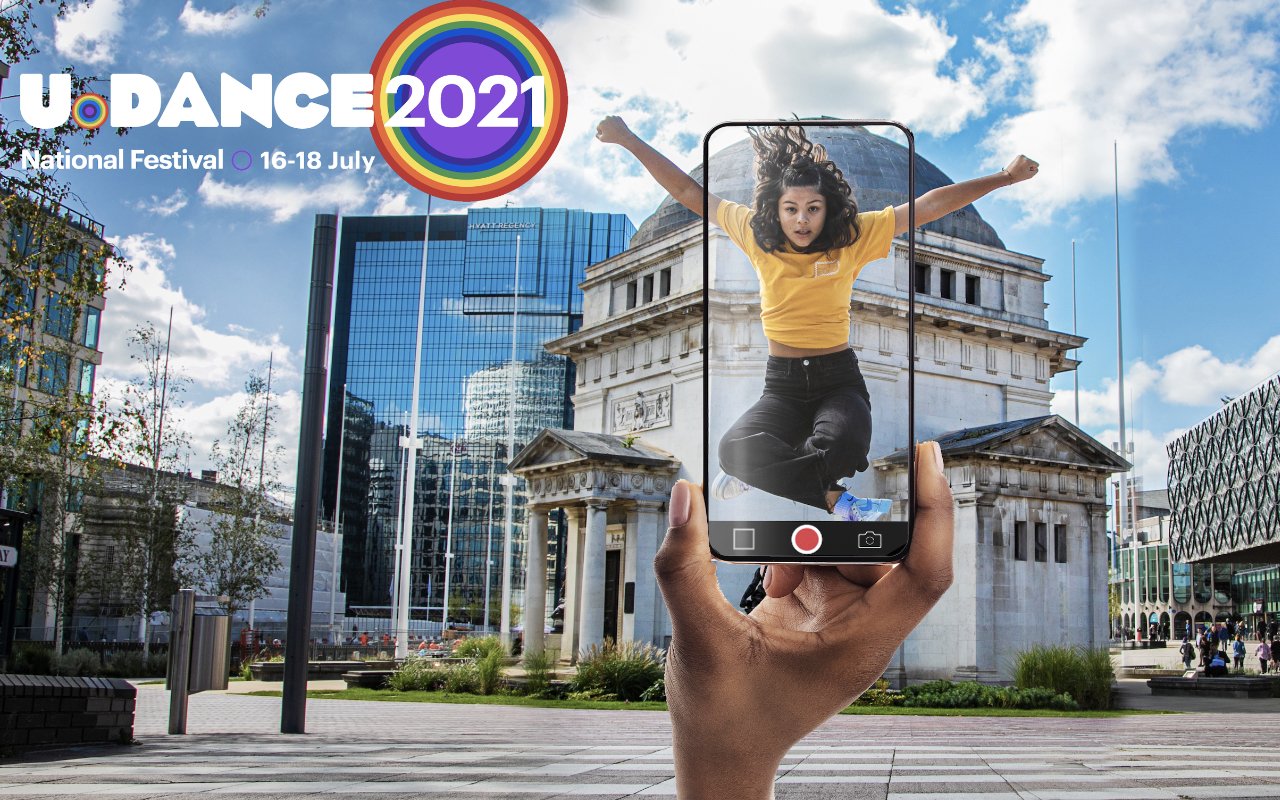
The theme for U.Dance 2021 is ‘Where can dance take you?’
Photo: Dani Bower
Who can dance?
As the U.Dance National Festival returns in an online format this month, Cameron Ball shares how the event connects the nation’s young dancers with the best in the industry.
Last summer One Dance UK produced U.Dance, the National Youth Dance Festival, in an online format for the first time. Its previous iteration involved hundreds of young dancers gathering annually in a changing host city for performances, workshops and dance career information. In a matter of weeks, we completely restructured the festival’s model to online delivery, making the content easy and free to access.
Adapting to a nation in lockdown, we brought the festival to the young people, presenting 30 varied digital sessions over three days with the biggest names in dance, including showcases, masterclasses, Q&As and dance challenges. If you hark back to those tentative, early days of lockdown, dancing and exercise, pushing furniture and pets aside for Zoom and Instagram Live classes, there was no previous example of a digital dance event on this scale.
The results of our work were astounding: 5,000 young dancers registering for sessions and a social media reach of 500,000. While ongoing restrictions and uncertainty means we have committed to a digital format again for this year’s U.Dance National Festival, we are excited and confident to build on 2020’s successes.
A 2021 encore
This summer, we all view the world through a different lens and that is certainly true of our young people. The theme of U.Dance 2021, therefore, is ‘Where can dance take you?’ Looking ahead to new possibilities, we aim to provide some inspiring answers to that question. What’s been so encouraging is the generosity in sharing knowledge that our stellar ensemble of session leaders has shown once again.
Aimed at those aged 11 to 19, or up to 25 for disabled dancers, U.Dance participants can choose to learn the audition material from Matthew Bourne’s Swan Lake, take part in audition tasters from leading West End shows, or take jazz, Kathak or Afro Fusion masterclasses.
They can ask questions of a Royal Ballet principal artist, an artistic director of a leading company, a dance psychologist, a hip-hop star, a Strictly Come Dancing professional, or the resident choreographer from the West End’s Matilda.
Providing pathways
Alumni of the U.Dance programme have gone on to perform and create for ballet companies, contemporary dance, West End musicals and high profile television and film dance work. But we all know a career in dance is not limited to performing on stage or screen. Let’s not forget the rest of the dance ecology: the managers, producers, educators and administrators, many of whom will have been inspired by dance at a young age by schemes such as U.Dance.
Visibility and inclusion
The current conversation around racial equality has reminded all of us working in the arts to think about true visibility and inclusion. At U.Dance it has always been the case that all styles of dance and all dancers are welcome, but this year we are even more keen to celebrate the brilliant diversity in dance.
There has been careful planning of the lineup of professionals and dance styles on offer, the needs of disabled participants and those with digital access issues, and the way we present dance as a viable career option for all young people.
The U.Dance National Festival uniquely connects the sometimes quite disparate worlds of private, school and community dance. Access to the arts is as important as ever, with dance being a proven weapon in the battle against the joint crises of obesity and mental health problems in our young people.
A chance to dance
Creative industries contributed more than £111bn to the UK economy in 2018, and the government’s UK Creative Industries Trade and Investment Board (CITIB) is aiming to increase UK creative exports by 50% by 2023. Providing access to cultural opportunity is not only beneficial for the next generation’s personal growth and wellbeing but is a solid financial investment.
One Dance UK’s advocacy work often focuses on the needs of young people. This is particularly crucial now with the recent Office for Students’ baffling proposals to cut per-student funding for art and design courses by 50% across higher education institutions in England.
As the subject association for dance in schools, we know that schools, colleges and universities play a hugely important role in providing access to the arts for our young people. Taking an axe to HE funding would be catastrophic for the arts talent pipeline.
Head of Children and Young People’s Dance at One Dance UK, Laura Nicholson, confirms this need for access: “I have witnessed dance in mainstream education increasingly come under immense threat, due to funding cuts and shifting educational priorities. U.Dance provides engagement for all young people, and also acts as a springboard for those with the talent, potential or the desire to take the next step.”
The digital format of the U.Dance National Festival is an ambitious, important example of how dance can communicate and influence in new ways, removing the traditional barriers of geography and cost. It is essential that we encourage access to dance regardless of circumstance.
In the future, how much more diverse would the art form be, and how much richer would all of us experiencing dance be, if we inspire and empower young artists from all backgrounds today?
Cameron Ball is a freelance arts producer and Festival Manager for U.Dance
![]() www.linkedin.com/in/cameronball/
www.linkedin.com/in/cameronball/
The U.Dance National Festival 2021 takes place 16-18 July. For further information and to sign up for free sessions visit: www.udancedigital.org.
Join the Discussion
You must be logged in to post a comment.